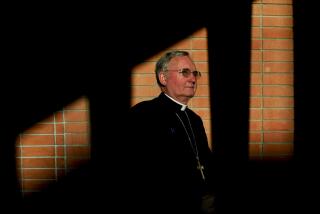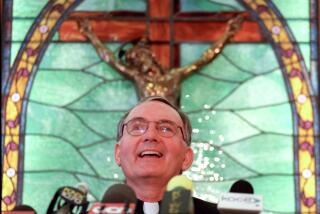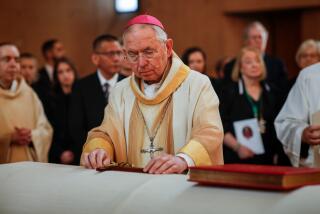Judge recalled as a modest, giving man
- Share via
Nearly 1,000 Southern Californians came to a South Pasadena church Saturday to celebrate the life and legacy of Judge Paul Boland, who died unexpectedly of cancer on Wednesday night at age 65.
The overflow crowd at Holy Family Catholic Church included dozens of jurists who had served with Boland on the Los Angeles County Superior Court and the state Court of Appeal, as well as his former students, lawyers who had appeared before him, relatives and friends.
The formal speeches delivered in the church sanctuary and comments made in dozens of small gatherings at a reception after the service had a common theme, perhaps stated most succinctly by state appeals court Justice Nora M. Manella: “In a world of takers, Paul was a giver.”
During the service, Msgr. Clement J. Connolly reminded the crowd that this was a moment to pause and reflect on how Boland lived -- always taking time for others.
“Paul learned well from his years with the Jesuits” that the important things in life are “love, honor and service,” Connolly said, referring to Boland’s time at Loyola High School.
A Los Angeles native, Boland graduated from USC Law School in the mid-’60s, worked at the Western Center on Law and Poverty, and with two other attorneys helped develop the first clinical trial advocacy program at UCLA Law School in the early 1970s. He was appointed to the Superior Court in 1981 and served there for 20 years before being tapped for the state Court of Appeal in 2001.
He mentored hundreds of law students and helped them get jobs. He mentored dozens of judges.
“This is really hard,” said Los Angeles Superior Court Judge Charles F. Palmer, who had known Boland for three decades and worked with him on poverty law projects. “You thought he was always going to be there,” Palmer said after paying his respects to Boland’s widow, Margaret Morrow, a U.S. District Court judge.
Earlier, retired Superior Court Judge Richard P. Byrne summed up how stunned Boland’s friends were at his swift demise. “There isn’t anyone here, who in their wildest imagination, would have said a week ago that we would be here today doing what we’re doing,” said Byrne, who served with Boland on the Juvenile Court bench.
He reminded the crowd that Boland was a “modest, self-effacing person” who “wouldn’t want people to make a fuss over him. Paul, please forgive us; we can’t help ourselves,” Byrne said before describing some of Boland’s work as a judge and a teacher.
Boland’s nephew, Justin R. Boland, a prosecutor in Everett, Wash., said, “When I was a young boy, I naturally assumed everyone in California was a Superior Court judge,” because “Uncle Paul” made it sound so routine. “He treated every honor as if it was a fluke or just his turn to win the award,” he said.
“It was not until I became a lawyer and started appearing before other judges. . . that I realized how deserving he was,” Justin Boland said, drawing laughter when he made it clear that he was not referring to any of the jurists in the audience.
Perhaps the most moving tribute to Boland was delivered by his son Patrick, now a junior at Colby College in Maine.
“Some saw him as a friend. . . some saw him as a teacher, some saw him as a legal juggernaut. I saw him in none of those roles and all of them. I remember him as my dad, a simple and humble man who never thought about himself.”
--
More to Read
Sign up for Essential California
The most important California stories and recommendations in your inbox every morning.
You may occasionally receive promotional content from the Los Angeles Times.













